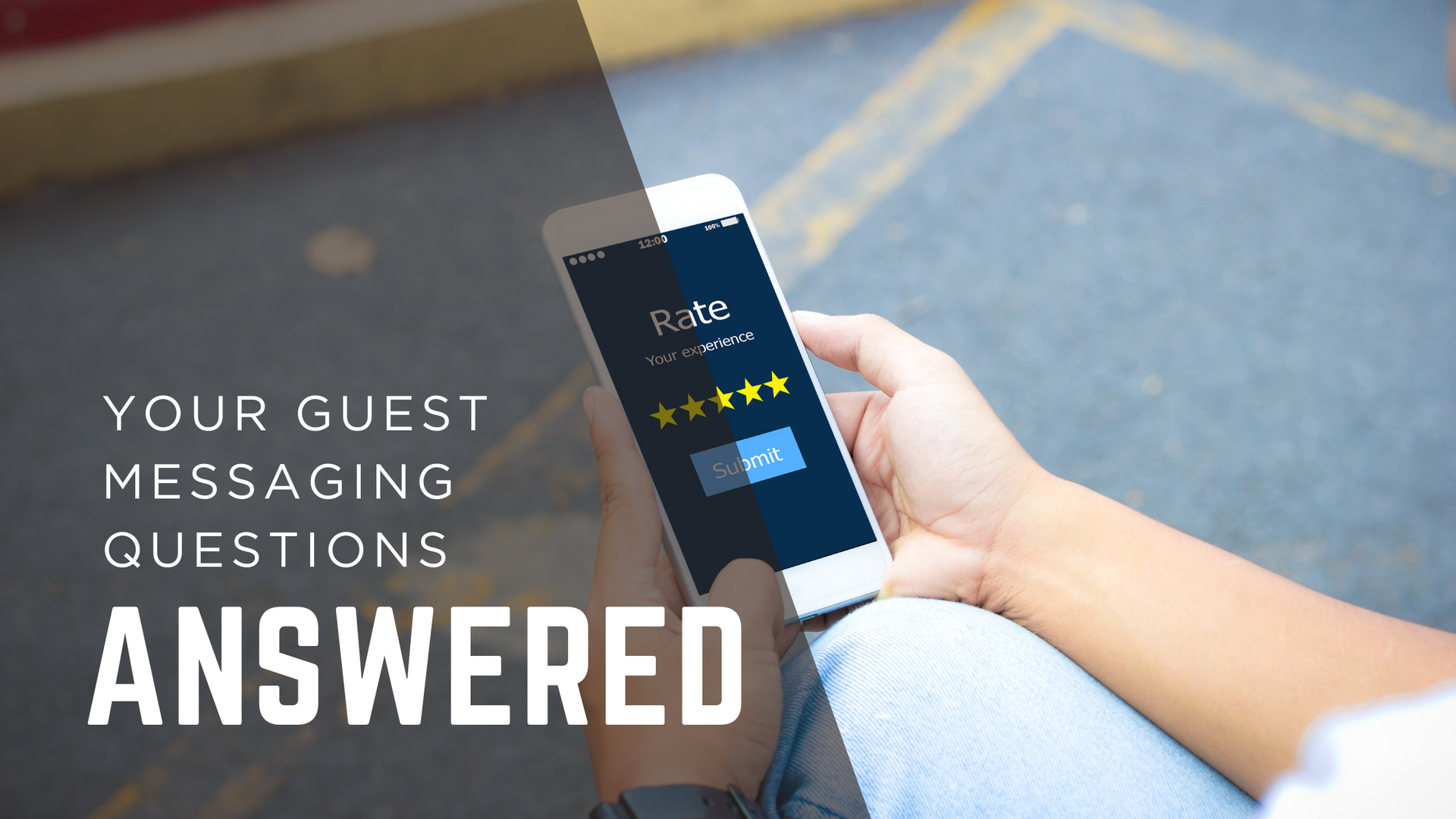Guest Communication Strategies for Airbnb Hosts
Guest Communication Strategies for Airbnb Hosts
Build Trust, Boost Reviews, and Save Time

In the fast-paced world of vacation rental hosting, communication is more than a nice-to-have—it’s a competitive edge. Whether you're welcoming a digital nomad, a couple on a weekend escape, or a family on holiday, how you handle your guest communication can directly influence your reviews, your booking rate, and your long-term success.
But staying on top of messages across platforms, automating without sounding robotic, and making sure nothing falls through the cracks? That takes real strategy. Many hosts underestimate how much time and energy it takes to communicate clearly and consistently—not just during the stay, but before and after as well.
In this guide, we’ll walk you through the most effective guest communication strategies for Airbnb hosts. From automation tools to custom message templates and quick-reply hacks, you’ll learn how to communicate with guests more efficiently—without sacrificing warmth, clarity, or the human touch.
Common Communication Challenges for Airbnb Hosts

No matter how seasoned you are as a host, guest communication can feel like a full-time job. Between pre-booking inquiries, mid-stay requests, and post-checkout reviews, the communication loop never really ends. And when it’s not handled well, it can lead to missed expectations, negative experiences, or even public complaints.
In this section, we’ll explore the most common challenges Airbnb hosts face when trying to manage communication—and why getting it right is essential to protecting your time, reputation, and revenue.
Managing Guest Communication Takes Significant Time
As a host, managing guest communication is often one of the most time-consuming aspects of the job. From answering pre-booking questions to sending check-in instructions and handling mid-stay concerns, the constant back-and-forth can quickly add up—especially if you’re juggling multiple listings or working solo.
Without a clear system in place, it’s easy to fall into reactive mode—responding to messages at all hours, manually repeating the same answers, or missing urgent guest inquiries altogether. Not only does this affect your ability to focus on other parts of rental management, but it can also negatively impact the guest experience when messages are delayed or inconsistent.
Modern Airbnb communication strategy requires more than just being responsive. It demands a structured approach that saves time while ensuring guests feel supported and heard from inquiry to checkout. This is where automation, message templates, and smart scheduling can make a world of difference.
Key Information Can Get Overlooked by Guests
Even when you provide detailed instructions, many guests will still miss important details—especially if those messages are too long, poorly formatted, or sent at the wrong time. Critical information like the Wi-Fi password, house rules, check-in procedures, or parking instructions can easily get buried in their inbox or skimmed over in a rush.
This leads to repeated questions, frustrated guests, and time wasted on clarifying things that should’ve been clear from the start. Worse, a missed detail—like a lockbox code or late check-out policy—can cause stress during the stay or trigger negative reviews.
To prevent this, it’s crucial to highlight essential info at key points in the communication timeline. Send shorter, well-structured messages with bolded instructions, bullet points, or even images. Reinforcing key rental details in a guest-friendly format doesn’t just save time—it creates a smoother, more professional experience that guests will appreciate.
Automation is one of the best tools available to modern Airbnb hosts—but it’s also one of the easiest to misuse. While scheduling welcome messages or sending check-out reminders can save time, relying too heavily on generic templates can make your communication feel cold or robotic.
Guests still want to feel like they’re interacting with a real person, not a system. A message that starts with “Dear guest” or overlooks their specific needs during their stay can make them feel like just another transaction—not a valued guest in your vacation rental.
To strike the right balance, smart hosts use automation as a foundation, then layer in personalization. This could be as simple as using the guest’s first name, referencing the reason for their visit, or customizing your tone to reflect your hosting style. Adding just a bit of warmth can turn a standard check-in message into a memorable welcome.
Delays in Guest Responses Due to Availability Issues
No matter how committed you are to providing a great guest experience, you can’t be available 24/7. If a guest sends an urgent message about a check-in issue or a mid-stay concern while you're asleep or offline, even a short delay can create unnecessary stress or dissatisfaction.
This challenge becomes even more pronounced for hosts managing multiple properties or balancing hosting with a full-time job. Without reliable systems in place, delayed communication can feel unprofessional—and may lead guests to leave a lower review, even if the rest of their stay was positive.
That’s why it’s important to set clear expectations about your response times and use automation to bridge the gap. A simple auto-reply confirming that you’ve received their message and will respond shortly can offer peace of mind. For critical moments like check-in, having scheduled messages and FAQs ready can ensure your guests feel supported, even when you're not immediately available.
Team Members Falling Short on Communication Standards
If you work with a team—whether that includes co-hosts, cleaning crews, or virtual assistants—guest communication becomes a shared responsibility. And while delegation is key to scaling your Airbnb hosting efforts, it can sometimes lead to misaligned messaging, inconsistent tone, or missed details that impact the guest experience.
For example, a guest might receive a warm, professional message from you during the booking process, only to get a short, unclear reply from someone else mid-stay. These disconnects can confuse guests, lower their trust, and make your property seem disorganized.
Maintaining high standards across your team requires more than good intentions. It means creating clear communication guidelines, using shared tools (like a unified inbox or message templates), and training your team to represent your voice and values. When everyone is on the same page, guests enjoy a seamless experience—no matter who they’re speaking to.
Best Guest Communication Strategies for Airbnb Hosts

Now that we've looked at the most common communication challenges, it’s time to focus on solutions. Whether you're managing a single Airbnb listing or running multiple vacation rentals, having strong guest communication strategies in place can save you time, improve your reviews, and elevate your entire hosting experience.
The best hosts don’t just respond to guest messages—they anticipate questions, streamline their workflows, and personalize every touchpoint to make guests feel cared for. From automation tools and guidebooks to message templates and check-in reminders, the strategies below will help you create a seamless, professional, and memorable experience for every guest who walks through your door.
When you're hosting across multiple platforms—Airbnb, Vrbo, Booking.com, or even direct bookings—managing guest messages can quickly become chaotic. A unified inbox helps you centralize all communication into one place, making it easier to track conversations, avoid missed messages, and respond quickly.
For busy hosts or property managers handling more than one vacation rental, this tool is a game-changer. It streamlines your communication workflow by allowing you to manage inquiries, reservation updates, and stay-related questions from one dashboard—eliminating the need to log in and out of different platforms.
Tools like Guesty, Hospitable, and Tokeet offer unified inbox features specifically designed for Airbnb hosts. With fewer inboxes to juggle, you’ll gain clarity, save time, and provide faster, more consistent service to your guests—something they’ll remember when it’s time to leave a review.
Use Automation Tools to Streamline Guest Communication While Maintaining Personalization
Automation tools can be a host’s best friend—if used wisely. Scheduling key messages like booking confirmations, check-in instructions, and check-out reminders can save hours of manual work while ensuring your guests receive timely, relevant communication throughout their stay.
But here’s the catch: automation without personalization can feel cold and transactional. The best Airbnb communication strategy blends efficiency with human warmth. Platforms like Hospitable, Hostaway, or Smartbnb let you build workflows that trigger messages based on the guest’s timeline, but also allow for dynamic variables like their name, arrival date, or booking source.
By automating the repetitive parts of guest communication while still keeping a conversational tone, you ensure your guests feel looked after—even when you’re not online. It’s a small investment in tools that pays off with better reviews, smoother operations, and more time back in your day.
Personalize Messaging with Custom Templates and Dynamic Variables
Even when using automation, your guest messages don’t have to feel generic. With custom templates and dynamic variables, you can personalize communication at every stage of the stay—making your guests feel seen and valued without typing out every response manually.
Dynamic variables let you pull in key booking details automatically—like the guest’s name, check-in date, or property address. Instead of sending a message that says, “Welcome,” you can say, “Hi Emily, we’re so excited to host you at our [Property Name] starting this Friday!” It’s a small touch that builds connection and sets a warm tone for the stay.
Using saved message templates also helps you stay consistent across multiple listings or team members. Whether it’s a welcome note, house rule reminder, or thank-you message after checkout, a personalized template ensures your communication reflects your voice, hospitality style, and standards as a host.
Share a Digital Guidebook to Provide Key Rental Information
A digital guidebook is one of the most effective tools for improving guest communication and reducing repetitive questions. Instead of relying on long emails or bulky printed materials, you can share an easy-access online guide that covers everything guests need to know—before, during, and after their stay.
Platforms like Touch Stay, Hostfully, and YourWelcome allow you to create beautiful, branded guidebooks that include check-in instructions, Wi-Fi details, appliance how-tos, emergency contacts, and even local recommendations. You can update them in real time, send them via a single link, and make sure every guest has what they need, when they need it.
It’s more than just convenience—it enhances the guest experience and makes your vacation rental feel professional and well-managed. Plus, when guests can find answers on their own, you’ll spend less time answering the same questions over and over again.
Ensure Important Check-In and Check-Out Details Are Highlighted
The check-in and check-out process sets the tone for the entire stay—and often determines whether your guest leaves a five-star review or a complaint. Even if you’ve already sent the information in previous messages, don’t assume guests remember or read everything.
Instead, make sure check-in and check-out details are highlighted at key moments. Use bold text for door codes, pin locations on Google Maps, and send reminders a day before arrival and departure. If your property has special instructions—like street parking or key retrieval—consider including photos or short videos for extra clarity.
By making this part of the experience stress-free, you build trust and reduce the risk of last-minute messages or confusion. Clear instructions are a simple but powerful way to elevate your Airbnb communication and make every stay feel seamless from the start.
Repeat Critical Information at Key Touchpoints During the Stay
One of the most overlooked strategies in guest communication is simple repetition. Guests often miss or forget key details, especially when they’re traveling, checking in late, or managing kids and luggage. That’s why it’s essential to reinforce important rental information at multiple stages of the stay.
Don’t rely on a single message to cover everything. Instead, space out communication in bite-sized, helpful chunks. For example, send a check-in message the morning of arrival, a Wi-Fi reminder on Day 1, and a friendly check-out note the night before departure. You can even automate these messages based on the booking timeline.
Repeating vital details like house rules, emergency contacts, or trash pickup days reduces friction and improves the overall guest experience. When communication is clear, consistent, and well-timed, guests are more likely to feel cared for—and leave glowing reviews in return.
Focus on Building Stronger Relationships Through Meaningful Communication
At its core, hosting is about hospitality—and the best hospitality is rooted in genuine connection. Even if you're managing your Airbnb remotely or using automation, it’s still possible to build relationships with your guests through thoughtful, intentional communication.
This could be a personalized welcome message, a quick check-in mid-stay to ask how things are going, or a kind thank-you note after they leave. Ask if they need anything or if there's a way you can make their stay more comfortable. These small gestures don’t take much time but can leave a lasting impression.
Remember, guests are more likely to overlook minor issues if they feel you're attentive, kind, and responsive. Strong relationships built on meaningful communication not only enhance the stay—they also increase your chances of getting repeat bookings, referrals, and five-star reviews.
Frequently Asked Questions About Guest Communication

What Are the Best Tools to Improve Guest Satisfaction?
Top tools like Hospitable, Touch Stay, Guesty for Hosts, and Hostaway help streamline guest communication through automation, centralized messaging, and dynamic templates. These platforms improve response times, reduce errors, and create a smoother, more professional rental experience—resulting in higher guest satisfaction and better reviews.
How Can You Compare Different Guest Communication Systems for Airbnb?
When choosing a guest communication system, consider the platform’s integrations (with Airbnb, Vrbo, Booking.com, etc.), message automation features, customization options, team access controls, and pricing. Most tools offer free trials—use them to test how well they fit your property management style before committing.
What Are Common Barriers to Effective Guest Communication?
Common barriers include:
- Disorganized inboxes and missed messages
- Overuse of generic templates
- Language or cultural misunderstandings
- Inconsistent team communication
- Lack of automation or scheduling tools
Solving these starts with the right systems and a clear communication flow.
What Strategies Help Enhance the Guest Communication Experience?
Great guest communication is built on:
- Speed: Respond quickly to questions
- Clarity: Keep messages short, helpful, and structured
- Personalization: Use names, local tips, and friendly tone
- Consistency: Use templates and repeat key info across touchpoints
- Thoughtfulness: Follow up mid-stay, thank guests afterward
How Can You Overcome Communication Challenges with Guests?
Use automation to stay responsive, but always layer in a human touch. Train your team, create custom templates, use visual guides, and implement digital tools that match your hosting style. The more organized and intentional you are, the easier it becomes to manage communication—especially during peak seasons or when handling multiple listings.
Conclusion: Hospitality Starts with Communication
At the heart of every five-star review is a guest who felt understood, supported, and valued. As an Airbnb host, the way you communicate shapes how your guests experience your property—and how they remember their stay long after check-out.
By implementing these guest communication strategies, you’re not just saving time or reducing stress. You’re creating space for better relationships, smoother processes, and standout guest experiences that lead to more bookings, stronger reviews, and long-term success.
So whether you're just starting your hosting journey or scaling up your vacation rental business, remember: great communication isn’t a nice touch—it’s the foundation of hospitality. Start refining your systems today, and let your messages speak volumes.
Share to social media
More posts





